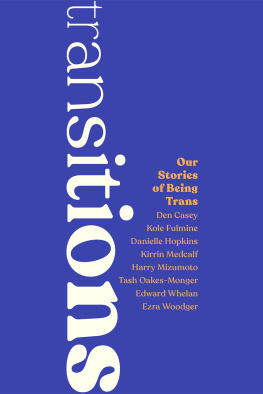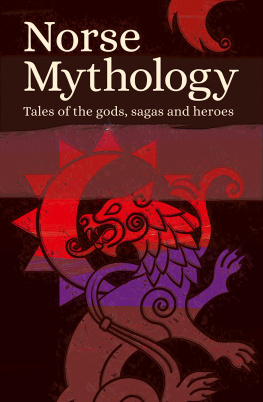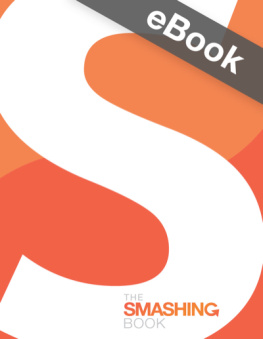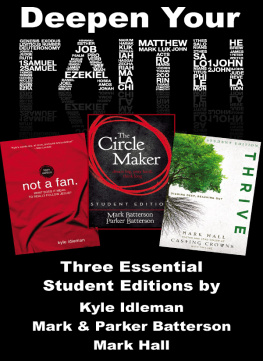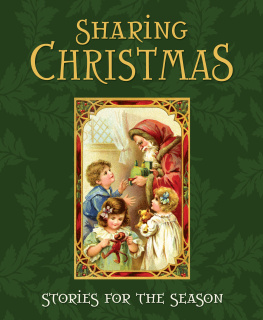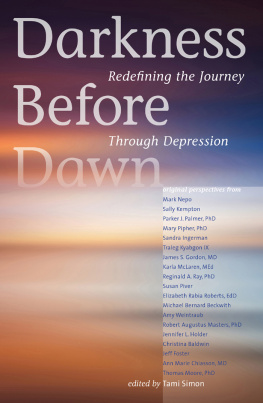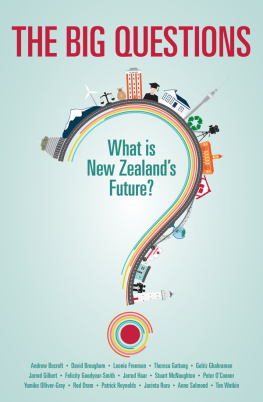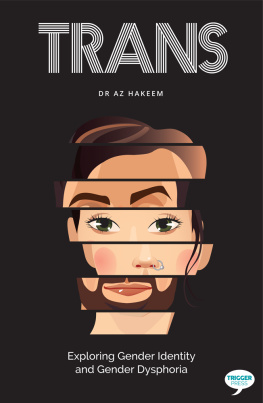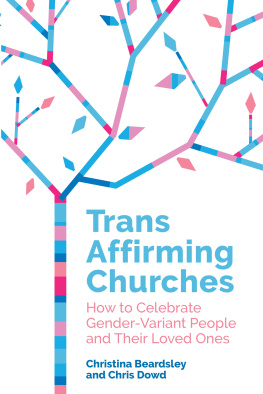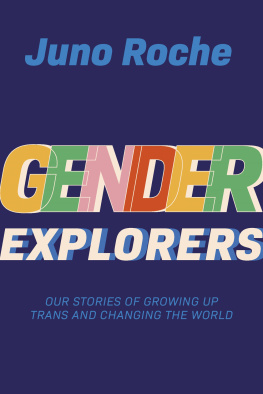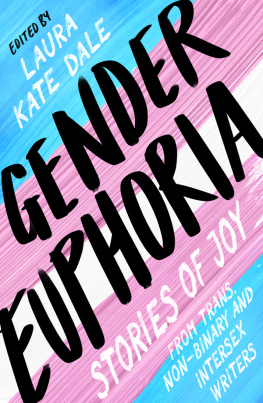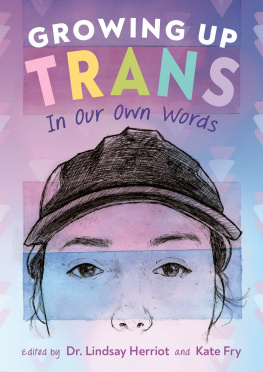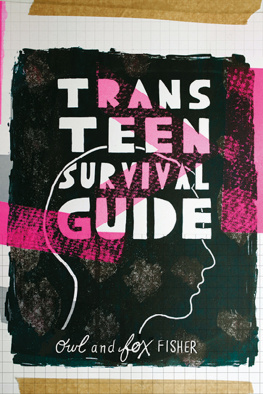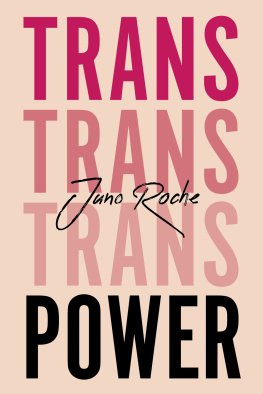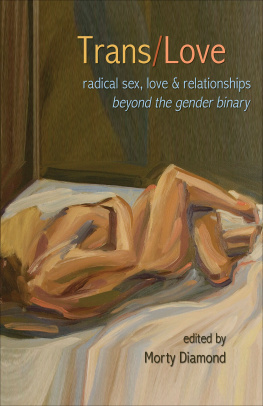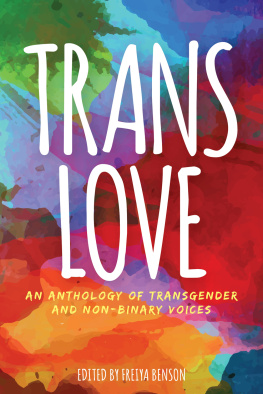Contents

Transitions
Our Stories of Being Trans
Den Casey, Kole Fulmine, Danielle Hopkins,
Kirrin Medcalf, Harry Mizumoto, Tash Oakes-Monger,
Edward Whelan and Ezra Woodger
Foreword by Sabah Choudrey, Juno Roche and Meg-John Barker
Afterword by Dr Jay Stewart, CEO, Gendered Intelligence

Contents
Foreword
Sabah Choudrey, Juno Roche
and Meg-John Barker
T he three of us Sabah Choudrey, Juno Roche and Meg-John Barker (along with Yvy De Luca) formed the judging panel for the inaugural JKP Writing Prize. The prize was for trans and/or non-binary writers, and contributors were invited to submit original, own-voice stories on the theme of trans everyday. Here we introduce the collection by discussing why we think a book like this is so vital, what stood out for us about the contributions, and where wed like to see the future of trans writing going.
Why is a collection like this important?
Sabah: We, as trans, non-binary and gender fluid people, know that our stories are often portrayed as negative, painful or heart-breaking. That might be what we carry every day but it isnt our lives every day. We are more than that. This collection is exactly what I want to see. It reminds us that we are more, we are exceptional, and we are a little bit special. We are ordinary, average, and sometimes quite clumsy. This collection is ours.
Juno: A collection like this is important as it shows trans writing breaking out of the binary I was in A and then I moved to B, or us explaining ourselves to them for the benefit of them, space. The writing in this collection feels fresh, exciting and most importantly spacious.
Meg-John: For me its three key reasons perhaps to summarize some of what others have already brought up here. First, this kind of collection is vital as we live through this ever-continuing moral panic about trans people. We need to write our lives out loud in a world where were demonized, pathologized, and our very existence is denied, as an act of resistance and survival. Second, in a world where the stories that get told about trans people are so limited, and trans people are so objectified as highlighted in the recent Disclosure documentary do a great job of demonstrating how diverse trans people are, how our lives dont only revolve around our transness, and how our genders intersect with other aspects of our experience. Finally, I think its powerful for us, as trans people, to have the opportunity to write our stories and have them celebrated, and its powerful for trans and non-binary folks to read such stories and see their own experiences mirrored. Theres an important sense of belonging that comes from being included in a collection like this, and from reading a collection like this.
What themes/stories stand out to you personally?
Juno: What stands out for me are the ideas around our bodies and our lives as being nuanced and connected to gender and the wider structures of gender rather than the simple process of becoming. The stories speak to gender in its widest context and therefore bring forwards a universality to the content.
Meg-John: I think for me what stand out are the beautiful small moments of everyday life that people capture: both the moments of mutual recognition and connection with other trans folk, and the moments of solitude and connection with our surroundings. Im thinking, for example, of the vignettes Tash shares of a day trip to Brighton with friends, surviving family Christmases via group chat, crying together after the election. Or Ezras story of finding kinship with a trans kid over his jacket. Or the importance of Kirrins LGBTQ mutual aid group during the pandemic. And Im also thinking of Kirrins solo journey through East Londons green spaces, picking wild garlic; of Edward taking the long route to work so he can look down at the river from the bridge to soothe his anxious inner child; and of Harry eating the banana in the kitchen as the rain falls outside. These moments of connection with others and place seem to be the important ones in which were affirmed in our experience, and simultaneously liberated from being trapped in outside views of us and our transness.
Sabah: I agree with Meg-John, its the small moments captured by these incredible writers in the writing that stand out for me, in particular the pauses and dead time where nothing is seemingly happening, just that we are existing. We dont have to explain ourselves all the time. We can just take a moment, no need to say why, and just be.
What is the future of trans writing?
Meg-John: Personally Im fascinated by the emergence of so many amazing trans creatives during this time of trans moral panic. Its deeply sad that were going through a time when even the pandemic doesnt seem to halt regular stigmatizing headlines and ill-informed celebrities engaging in trans debate. And its horrendous that those who do create into this rotten culture are subject to so much attack. But it is wonderful indeed that weve got to the point where it would take far too long to list all the powerful trans writers and other creatives who are out there, just in the UK. As I said in my blog post for JKP in the run up to the prize, I love the fact that trans creatives like Travis Alabanza, CN Lester, Amrou Al-Kadhi and Juliet Jacques and you two of course! are troubling conventional trans narratives in their memoirs, and putting out all kinds of stories about transness, centring different intersections, and querying binaries such as pride and shame, pre and post, man and woman, cis and trans, euphoria and dysphoria, and more.
Sabah: Thats it more voices, more explorations and more questions. As humans we are expert at asking, why? As trans people we are expert at asking, why not? We can write our own futures because the future of trans writing is truly ours. The proof is right here in your hands.
Juno: The future is endless. We have only just started.
Edited by Jos Twist, Ben Vincent, Meg-John Barker and Kat Gupta, Jessica Kingsley Publishers. London, 2020.
We Are Everywhere
Tash Oakes-Monger
S itting down to write this, there are lots of trans everyday stories I could tell. The story of patience while waiting for gender clinics, for surgeries, for hormones, for acceptance. The story of shame and sadness, of coming out, of being in the closet, of parents and work and doctors. The particular story of my body and scars and pain and change and healing. There is a narrative that is expected, one that is medicalized and pathologized and sad and alone. But this is my chance to tell a story, and the one I want remembering is one of queer rage and joy and untouchable love between trans people.
It is Christmas and we are all separated to our family homes. Before we part, we set up an emoji code for our group chat. Symbols for when we are misgendered, when we are sad, when we need an emergency call. We keep in contact, sending voice notes and videos, photos and words of encouragement. When it is over, we return to London and congregate at Freddys. We make pancakes in the kitchen and dance to old songs. We spill out the pain of the week that has been. It is a catharsis. We get into bed and pass a smoke around. We nap, and when we wake up, everything feels better.
One weekend in February we get the train to Brighton, and Toby is wearing a fur coat that he found for 15. It is white and soft and like something from a fashion show, and he is delighted. I am wearing dungarees and Freddy has a dangling skeleton earring in his right ear. We get a lot of looks; it isnt a surprise. We dance down the platform, singing and laughing. We share a double bed for the weekend. We buy the biggest jar of jalapeos and bend double with the hilarity of it. We share a bath. Our bodies normally bound and covered, but not now. The gentleness of this moment, the vulnerability to see them like this, is the biggest privilege of my life. Freddy does a face mask and we are near crying with laughter when it wont come off. We cook up a feast and do tarot readings at the table. We watch a movie with popcorn and talk into the night. We triple spoon.

